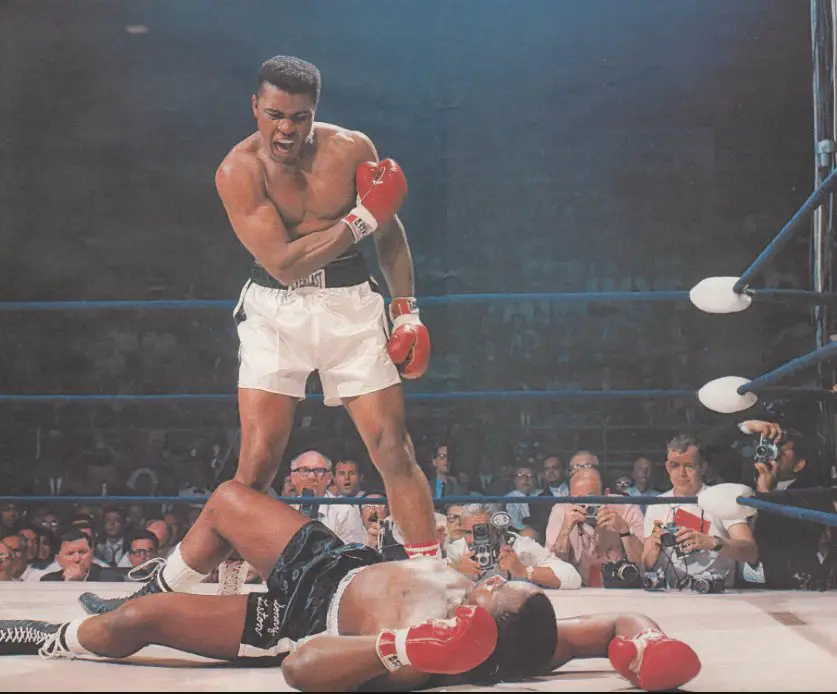The Underdog Who Stunned the World: Muhammad Ali’s Defining Moment
Picture this: A 22-year-old brash loudmouth standing toe-to-toe with one of the most feared boxers alive. Reporters laughed. Fans rolled their eyes. The odds? 7-to-1 against him. But by the end of that February night in 1964, the world wasn’t laughing anymore. It was stunned.
That loudmouth was Cassius Clay, soon to be Muhammad Ali, and the moment he shocked Sonny Liston would change boxing, sports, and culture forever.
Who Was Sonny Liston?
To understand the scale of the upset, you have to know who Ali was up against. Sonny Liston wasn’t just a heavyweight champion. He was a walking nightmare. Huge. Menacing. Silent. He destroyed Floyd Patterson in one round to win the title and crushed him again just for good measure.
Liston was the kind of guy who made opponents flinch just by looking at them. Journalists didn’t just expect him to win. They wondered if Clay would survive.
Enter the Mouth from Louisville
Cassius Clay, on the other hand, was a talker. He rhymed. He boasted. He promised he’d “float like a butterfly and sting like a bee” and most people thought he was delusional. Sure, he had talent, but he’d been knocked down by journeymen. He was fast, but he looked skinny next to Liston’s hulking frame.
And yet, Clay didn’t just predict victory. He guaranteed it. Loudly.
The Fight That Didn’t Go to Script
On February 25, 1964, in Miami Beach, the world tuned in expecting a massacre. What they saw instead was a lesson in speed, strategy, and heart.
From the first bell, Clay danced. Liston lunged and missed. Clay snapped jabs in his face and spun away. Round after round, the big man couldn’t land the shot everyone expected.
Then, in round four, panic. Clay staggered. His eyes were burning. He cried out to his corner that something was wrong. Historians now believe Liston’s gloves might’ve been tainted, accidentally or otherwise.
But Clay survived. And when he came back in round five, he was sharper than ever. By round six, Liston looked tired, confused, old.
And then, he quit.
Didn’t get knocked down. Didn’t go out swinging. He just sat on the stool and refused to come out for round seven. The crowd didn’t even know what had happened. Confusion turned to shock, and then to eruption.
Cassius Clay had done it.
“I Shook Up the World!”
Clay ran around the ring shouting, “I am the greatest! I shook up the world!” And honestly? He wasn’t wrong.
This wasn’t just a win. It was a seismic shift. In a world still reeling from civil rights protests and Cold War tensions, Clay represented something new. He wasn’t humble. He wasn’t quiet. He was bold, unfiltered, and unapologetically Black.
Two days later, he announced he’d joined the Nation of Islam and was changing his name to Muhammad Ali. The sports world exploded. Some celebrated. Many turned on him.
More Than Just a Fighter
Clay ran around the ring shouting, “I am the greatest! I shook up the world!” And honestly? He wasn’t wrong.
This wasn’t just a win. It was a seismic shift. In a world still reeling from civil rights protests and Cold War tensions, Clay represented something new. He wasn’t humble. He wasn’t quiet. He was bold, unfiltered, and unapologetically Black.
Two days later, he announced he’d joined the Nation of Islam and was changing his name to Muhammad Ali. The sports world exploded. Some celebrated. Many turned on him.
Legacy of the Underdog
When Ali beat Liston, he wasn’t supposed to win. But that’s the thing about greatness. It doesn’t care about odds.
Ali taught us that belief can bend reality. He showed us that underdogs aren’t always underpowered. Sometimes, they’re just underestimated.
That fight wasn’t just a boxing match. It was a turning point. For sports. For race. For politics. For the idea that maybe, just maybe, the loud kid with the impossible dream isn’t crazy. He’s a prophet.
And when he wins? He doesn’t just win the fight. He wins the world.
Sources:
1. ESPN – Muhammad Ali vs. Sonny Liston
2. History.com: Cassius Clay Defeats Sonny Liston

